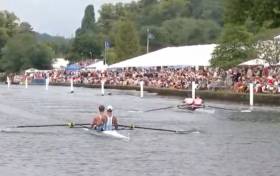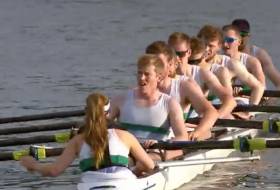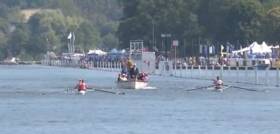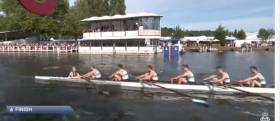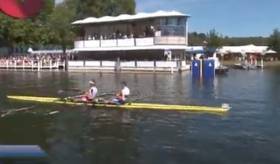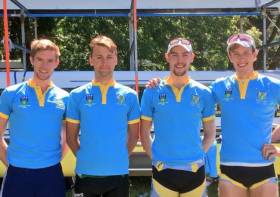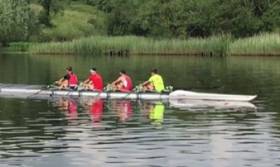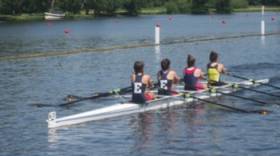Displaying items by tag: Henley Royal Regatta
#Rowing: Mark O’Donovan and Shane O’Driscoll made their exit at the semi-final stage at Henley Royal Regatta today. The Skibbereen pair in the Silver Goblets moved off the start well and took a small lead, but they could not shake off Agustin Diaz and Axel Haack of Argentina.
With each stroke through the middle of the course, the Argentina pair gained traction. The drew level and then passed O’Donovan and O’Driscoll. They opened a big lead and won well.
Henley Royal Regatta, Day Four (Selected Results; Irish interest)
Silver Goblets (Men’s Pairs, Open): A Diaz and A Haack bt M O’Donovan and S O’Driscoll (Skibbereen) 2¾ l
#Rowing: Irish crews had two remarkable wins in quick succession at Henley Royal Regatta on Friday evening.
Commercial came from behind to beat Cercle de l’Aviron de Lyon by three-quarters of a length in the Thames Cup. The French seemed to have a strong hold on the race, but stroke Colm Dowling and his crew rowed through them. The Irish champions then repulsed a late charge to win.
UCD seemed set for a grim battle with RG Dusseldorf and Crefelder in the Visitors’ and there was little between them in the middle stages of the race. But the Irish four – also national champions in this boat – sped away from the Germans across the flat water to win well.
Both crews joined Mark O’Donovan and Shane O’Driscoll, who won in their round of the Silver Goblets, in Saturday’s draw.
Henley Royal Regatta, Day Three (Selected Results; Irish interest)
Thames (Men’s Eight, Club): Commercial bt Cercle de l’Aviron de Lyon ¾ l
Visitors (Men’s Four, Club and University): UCD bt Dusseldorf and Crefeld 2¾ lengths
Hambleden Pairs (Women’s Pairs, Open): G Prendergast, K Gowler bt S O’Connor, N Long 2¼ l
Silver Goblets (Men’s Pairs, Open): Mark O’Donovan and Shane O’Driscoll (Skibbereen) bt H Hogan and H Elworthy 2¼ l
Double Sculls (Men’s Double, Open): J Collins, G Thomas bt Nathan Hull and OJ Dix (Queen’s, Belfast and Leander) 1l
#Rowing: Skibbereen men Mark O’Donovan and Shane O’Driscoll won their first race at Henley Royal Regatta. The Skibbereen pair eased into Saturday’s draw in the Silver Goblets by beating Hugo Elworthy and Harry Hogan with little drama. O’Donovan and O’Driscoll used their very fast start to leave the Doncaster crew behind and then took advantage of the very good conditions to stay clear while easing their rate down.
Henley Royal Regatta, Day Three (Selected Results; Irish interest)
Hambleden Pairs (Women’s Pairs, Open): G Prendergast, K Gowler bt S O’Connor, N Long 2¼ l
Silver Goblets (Men’s Pairs, Open): Mark O’Donovan and Shane O’Driscoll (Skibbereen) bt H Hogan and H Elworthy 2¼ l
Double Sculls (Men’s Double, Open): J Collins, G Thomas bt Nathan Hull and OJ Dix (Queen’s, Belfast and Leander) 1l
O'Connor and Long Race World's Best Pair at Henley
#Rowing: Grace Prendergast and Kerri Gowler, the world’s best women’s pair, beat Sadhbh O’Connor and Natalie Long of NUIG and Skibbereen in the heat of the Hambleden Pairs at Henley Royal Regatta today. The Irish women, who had qualified, saw the New Zealanders move away from them and win well.
Henley Royal Regatta, Day Three (Selected Results; Irish interest)
Hambleden Pairs (Women’s Pairs, Open): G Prendergast, K Gowler bt S O’Connor, N Long
#Rowing: Commercial beat City of Oxford by three and a quarter lengths in the second round of the Thames Cup at Henley Royal Regatta today. The Dublin club left their opponents behind them early on and rowed home under little pressure. They face French opponents, Cercle de l’Aviron de Lyon, on Friday.
Henley Royal Regatta, Day Two (Irish interest)
Thames (Men’s Eight, Club): Commercial bt City of Oxford 3¼ l.
Visitors (Men’s Four, Club and University): UCD bt Leander Club 2¼ l.
Fawley (Junior Men’s Quadruple): Christiana Roklub, Norway bt Enniskillen RBC 1/3 l.
Double Sculls (Men’s Double, Open): Nathan Hull and O Dix (Queen’s, Belfast and Leander) bt MS Cummings and Z Youell 3 1/3 l.
Princess Royal (Women’s Single, Open): JL Cole-Hossian bt Orla Hayes (Skibbereen) easily
Queen's Sculler Hull Eases Into Next Round at Henley
#Rowing: Nathan Hull of Queen’s University, Belfast, and Olly Dix of Leander won their heat of the Double Sculls convincingly at Henley Royal Regatta today. They faced a Thames Rowing Club crew which could not match them and were well behind through the race. Hull and Dix eased off at the finish and won by three and a third lengths.
Henley Royal Regatta, Day Two (Irish interest)
Visitors (Men’s Four, Club and University): UCD bt Leander Club 2¼ l
Fawley (Junior Men’s Quadruple): Christiana Roklub, Norway bt Enniskillen RBC 1/3 l
Double Sculls (Men’s Double, Open): Nathan Hull and O Dix (Queen’s, Belfast and Leander) bt MS Cummings and Z Youell 3 1/3 l
Princess Royal (Women’s Single, Open): JL Cole-Hossian bt Orla Hayes (Skibbereen) easily
Skibbereen Sculler Hayes Takes Her Bow at Henley
#Rowing: Orla Hayes was beaten by Jordan Lara Cole-Hossain in the Princess Royal, for open single sculls at Henley Royal Regatta today. The Thames Rowing Club sculler had a big advantage over her Skibbereen opponent down the course, and won easily.
Hayes had qualified for this tough event.
Henley Royal Regatta, Day Two (Irish interest)
Visitors (Men’s Four, Club and University): UCD bt Leander Club 2¼ l.
Fawley (Junior Men’s Quadruple): Christiana Roklub, Norway bt Enniskillen RBC 1/3 l.
Princess Royal (Women’s Single, Open): JL Cole-Hossain Orla Hayes (Skibbereen) easily
UCD Cruise Through First Round of Visitors' at Henley
#Rowing: UCD began their campaign in the Visitors’ four with a straight-forward win. With just a few hundred metres gone, the Irish crew of Shane O’Malley, Andrew Goff, Shane Mulvaney and David O’Malley were in the lead and Leander Club were not doing well with steering. UCD took control and had two and a quarter lengths to spare in the win.
Henley Royal Regatta, Day Two (Irish interest)
Visitors (Men’s Four, Club and University): UCD bt Leander Club 2¼ l.
Fawley (Junior Men’s Quadruple): Christiana Roklub, Norway bt Enniskillen RBC 1/3 l.
Surprise Defeat for Enniskillen at Henley Royal Regatta
#Rowing: Enniskillen were beaten in the Fawley Cup for junior men’s quadruples at Henley Royal Regatta this morning. Christiana Roklub of Norway moved into the lead and while they lost a little momentum when they were forced by the umpire to adjust their steering, they survived a late push by Enniskillen to win by just a third of a length.
Henley Royal Regatta, Day Two (Irish interest)
Fawley Cup (Junior Men’s Quadruple): Christiana Roklub, Norway bt Enniskillen RBC 1/3 l.
#Rowing: Enniskillen Royal Boat Club made their exit from the Diamond Jubilee for junior women’s quadruples in the first round today. Notts County eked out a lead and held on to it under pressure from the Fermanagh girls. They won by less than a length.
Henley Royal Regatta – Day One (Irish interest)
Thames Cup (Men’s Eights, Club): Commercial bt Nottingham RC 3½ l.
Diamond Jubilee (Junior Women’s Quadruple): Notts County RA bt Enniskillen Royal Boat Club


























